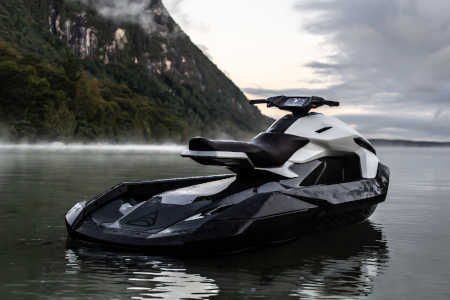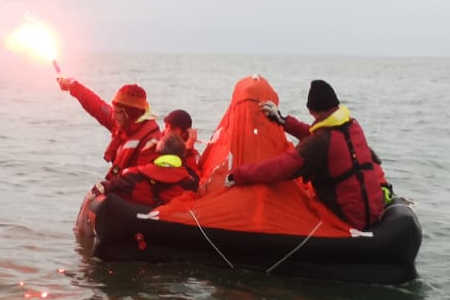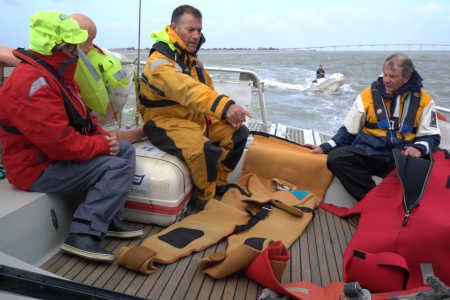The minimum age to take the coastal pleasure boating license exam is 16 years old. This is the same age for the river and offshore licenses.
It is also possible, if you are at least 16 years old, to practice accompanied driving on a boat at sea.
The accompanying person must have held a coastal or offshore boat license for at least 3 years and must declare it to the relevant maritime affairs service in the geographical region.
This is a frequently asked question. There is a "scientific equation" to determine the ratio of sail area, boat weight under load, and engine power to define if the sailboat's sails are the main means of propulsion and the engine is an auxiliary means, thus not requiring a boat license. In the opposite case, the coastal pleasure boating license or a boat license is required.


Indeed, to use certain radio equipment, the operator must hold a certificate attesting to their skills.
For a VHF with or without DSC, the required certificate is the CRR (Short Range Certificate).
Since 2011, it is enough to have at least the coastal pleasure boating license when navigating within 6 miles of shelter in territorial waters. Beyond that, the CRR remains mandatory.
Yes, if you are navigating beyond French territorial waters and internationally.
Depending on the audience, a motorboat for motorboat users or a sailboat for sailboat users.
The sailboat used is a powerful motorized sailboat that requires a boat license to operate.
Regardless of the type or category of the vessel, it is important to have the basic knowledge of nautical safety.
No disadvantages, on the contrary, the training is much more complete on a larger vessel. This training allows for better environmental analysis before performing any maneuvers, whether in the harbor or at sea.
In practice, and according to the legislation, you need a minimum of 2 hours at the helm to take the boat license exam after passing the theoretical exam.
In addition to this, you need 1.5 hours of collective practical training.
Once you are ready for the theoretical exam registration, the training center will register you. The exam is in the form of a multiple-choice questionnaire (MCQ).
Your theoretical knowledge is tested in a 30-question MCQ, with 5 errors allowed. You will retain the benefit of passing the theoretical option for 18 months, after which, if you haven't yet passed the practical exam for the boat license, you will need to retake the theoretical exam.
No, there is no actual exam for the practical part. The practical skills are validated once you have reached the competencies outlined in the certification booklet that follows you. This part of the training lasts 3.5 hours in total, with 2 hours at the helm of a boat and 1.5 hours in collective training.
Yes, we are also aware that some people may have little experience and may need a refresher. We offer 1 or 2 hours to review basic concepts together and allow you to learn more.
On lakes and rivers up to the first maritime obstacle (bridge, lock...), the coastal license is required. Beyond that, you need a river license, as is the case for canals. The river license also allows navigation on lakes.
Regardless of their option (coastal and inland waters), boat licenses issued after completing training at an accredited center are valid for life. No medical examination is required.
However, if you rarely sail, a quick refresher on essential safety rules from time to time is never a bad thing. The boat license, even in La Rochelle with Infornav, is not like riding a bike; it can be forgotten.
Yes, it is mandatory unless you are accompanied by a professional jet ski instructor who supervises the outing under their responsibility.
In practice, you can directly contact Infornav at 07 61 45 94 17 to schedule an appointment, or you can send an email to "contact@infornav.fr" and request to be contacted. Alternatively, you can use the contact form.
Visit the page dedicated to administrative procedures, where you can download the CERFA form for your registration and a certificate of physical fitness to be filled out by your doctor.
You will also find a link to pay the tax stamps online (38€ and 70€), a copy of your ID, and a color photo to meet the standards, and you’ll be ready to start your boat license training in La Rochelle.
As we mention in our article dedicated to the INFORNAV boat license in La Rochelle.
For several years, it's not uncommon to see success rates consistently flirting with 99%, but it is certain that upon closer inspection, gaps can be found, especially in the practical application of essential safety standards.
During the INFORNAV boat license training, we focus primarily on safety in real-life situations during a three-day session!!
You will be much more confident, knowing you can handle situations where the average novice boater might panic, turning what could be a major incident into a real disaster.
We could simply answer by highlighting an interesting pricing policy, especially as it benefits from a substantial 20% discount throughout 2020.
But we prefer to draw your attention to our references when it comes to spreading safety rules. You can consult our qualifications and expertise in various fields.
We really put a lot of energy into conveying important messages and putting our trainees in real-life safety situations during our training, so they gain confidence and are able to face situations that put themselves and their crew at risk.
The slightest incident can have serious consequences if the correct actions aren’t taken at the right moment.
We want to make our boat license training in La Rochelle a reference.


Since the latest reform, the instructor is also the examiner for the practical boat license. There is no longer a state examiner to assess the practical part of the exam.
Yes, all boat licenses, regardless of the option, are valid for life.
You simply need to take the inland waterway code exam at an accredited center, as the practical part is already covered.
You can consult the official website of the French administration at https://www.service-public.fr/particuliers/vosdroits/F14022
This is a hotly debated topic among boaters, but we believe that even when using a sailboat, you are navigating on maritime routes. The coastal license ensures you have at least the basic knowledge of nautical safety.
The minimum age to take the coastal pleasure boating license exam is 16 years old. This is the same age for the river and offshore licenses.
It is also possible, if you are at least 16 years old, to practice accompanied driving on a boat at sea.
The accompanying person must have held a coastal or offshore boat license for at least 3 years and must declare it to the relevant maritime affairs service in the geographical region.
This is a frequently asked question. There is a "scientific equation" to determine the ratio of sail area, boat weight under load, and engine power to define if the sailboat's sails are the main means of propulsion and the engine is an auxiliary means, thus not requiring a boat license. In the opposite case, the coastal pleasure boating license or a boat license is required.


Indeed, to use certain radio equipment, the operator must hold a certificate attesting to their skills.
For a VHF with or without DSC, the required certificate is the CRR (Short Range Certificate).
Since 2011, it is enough to have at least the coastal pleasure boating license when navigating within 6 miles of shelter in territorial waters. Beyond that, the CRR remains mandatory.
Yes, if you are navigating beyond French territorial waters and internationally.
Depending on the audience, a motorboat for motorboat users or a sailboat for sailboat users.
The sailboat used is a powerful motorized sailboat that requires a boat license to operate.
Regardless of the type or category of the vessel, it is important to have the basic knowledge of nautical safety.
No disadvantages, on the contrary, the training is much more complete on a larger vessel. This training allows for better environmental analysis before performing any maneuvers, whether in the harbor or at sea.
In practice, and according to the legislation, you need a minimum of 2 hours at the helm to take the boat license exam after passing the theoretical exam.
In addition to this, you need 1.5 hours of collective practical training.
Once you are ready for the theoretical exam registration, the training center will register you. The exam is in the form of a multiple-choice questionnaire (MCQ).
Your theoretical knowledge is tested in a 30-question MCQ, with 5 errors allowed. You will retain the benefit of passing the theoretical option for 18 months, after which, if you haven't yet passed the practical exam for the boat license, you will need to retake the theoretical exam.
No, there is no actual exam for the practical part. The practical skills are validated once you have reached the competencies outlined in the certification booklet that follows you. This part of the training lasts 3.5 hours in total, with 2 hours at the helm of a boat and 1.5 hours in collective training.
Yes, we are also aware that some people may have little experience and may need a refresher. We offer 1 or 2 hours to review basic concepts together and allow you to learn more.
On lakes and rivers up to the first maritime obstacle (bridge, lock...), the coastal license is required. Beyond that, you need a river license, as is the case for canals. The river license also allows navigation on lakes.
Regardless of their option (coastal and inland waters), boat licenses issued after completing training at an accredited center are valid for life. No medical examination is required.
However, if you rarely sail, a quick refresher on essential safety rules from time to time is never a bad thing. The boat license, even in La Rochelle with Infornav, is not like riding a bike; it can be forgotten.
Yes, it is mandatory unless you are accompanied by a professional jet ski instructor who supervises the outing under their responsibility.
In practice, you can directly contact Infornav at 07 61 45 94 17 to schedule an appointment, or you can send an email to "contact@infornav.fr" and request to be contacted. Alternatively, you can use the contact form.
Visit the page dedicated to administrative procedures, where you can download the CERFA form for your registration and a certificate of physical fitness to be filled out by your doctor.
You will also find a link to pay the tax stamps online (38€ and 70€), a copy of your ID, and a color photo to meet the standards, and you’ll be ready to start your boat license training in La Rochelle.
As we mention in our article dedicated to the INFORNAV boat license in La Rochelle.
For several years, it's not uncommon to see success rates consistently flirting with 99%, but it is certain that upon closer inspection, gaps can be found, especially in the practical application of essential safety standards.
During the INFORNAV boat license training, we focus primarily on safety in real-life situations during a three-day session!!
You will be much more confident, knowing you can handle situations where the average novice boater might panic, turning what could be a major incident into a real disaster.
We could simply answer by highlighting an interesting pricing policy, especially as it benefits from a substantial 20% discount throughout 2020.
But we prefer to draw your attention to our references when it comes to spreading safety rules. You can consult our qualifications and expertise in various fields.
We really put a lot of energy into conveying important messages and putting our trainees in real-life safety situations during our training, so they gain confidence and are able to face situations that put themselves and their crew at risk.
The slightest incident can have serious consequences if the correct actions aren’t taken at the right moment.
We want to make our boat license training in La Rochelle a reference.


Since the latest reform, the instructor is also the examiner for the practical boat license. There is no longer a state examiner to assess the practical part of the exam.
Yes, all boat licenses, regardless of the option, are valid for life.
You simply need to take the inland waterway code exam at an accredited center, as the practical part is already covered.
You can consult the official website of the French administration at https://www.service-public.fr/particuliers/vosdroits/F14022
This is a hotly debated topic among boaters, but we believe that even when using a sailboat, you are navigating on maritime routes. The coastal license ensures you have at least the basic knowledge of nautical safety.